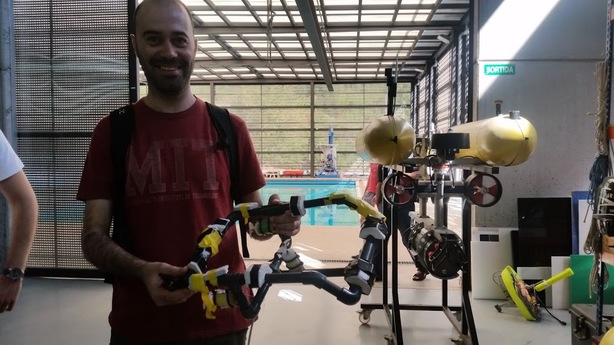Early last Sunday I left sunny mid-Wales for the last ever meeting in our EU Erasmus+ project “Early Mastery/Playful Coding”.


We flew from Bristol to Girona with Ryanair (who call Girona “Barcelona”, which gives some clue to its location). The cloud cover cleared as soon as we crossed the channel, and the view from the airplane was rather lovely. The Pyrenees in particular were stunning.
Once in Girona we met up with the Ysgol Bro Hyddgen crew, teachers from the school up the road in Machynlleth. A chatty evening spent in a lovely riverside bar rounded off the day of travel nicely. Monday morning, bright and early, we headed up into Girona old town for the project meeting proper.
Here’s our (now traditional) meeting arrival selfie: from left to right, Tegid (technology teacher from Bro Hyddgen) and Anna (Welsh teacher from Bro Hyddgen), Martin (schools liason teaching fellow, Aberystwyth Uni) and me, Tomi (ICT teacher from Bro Hyddgen). One of the great things about this project and these meetings in general is we’ve ended up building really good links with the school just up the road, as well as with people across the EU.

The project
Over the last 18 months I’ve written quite a few blog posts about the project. We’ve done a lot of schools work and we’ve had 5 management meetings (of which this was the last). We’ve also had 2 longer “training meetings”, where teachers and academics have tried out each other’s workshops. Every workshop we’ve written has been run by more than one group, and most (indeed all but one) have been run in 2 or 3 different countries. Impact wise we’ve done quite a lot:
- 45 talks, seminars, training days or other events
- 80 schools
- 600 teachers
- 4000 students
- 1 book
Did I mention we’ve written a book? The book contains instructions and information for running these workshops yourself. If you’re a teacher looking for easy lessons, or a lecturer looking for cool outreach, or a professional running a code club, or just an interested parent… the book has some great ideas in it. And some typos. But that’s not the end of the world.
The book launch
Our book “Playful Coding: Engaging young minds with creative computing” has been written, collated, edited, typeset and is now not only a PDF (available for free from http://playfulcoding.udg.edu/teacher-guide/, English now, translations to follow) but is also a physical printed book which looks frankly lovely.
As a team, we are skeptical about learning-to-code initiatives that concentrate on getting the skills to get a good job. Coding should be fun, challenging and playful. We hope this comes through in the book. There’s talk about assessment and pedagogy but there’s also a lot of fun, and the activities are all fundamentally cross curricular and hopefully playful.

The meeting concluded with a formal book launch where local teachers came to pick up a physical copy and chat with us over coffee and cake. It was really cool to see so many local teachers turn up to pick up a book in English – we will offer the other project languages (Spanish, Catalan, Romanian, Italian, French, Welsh) shortly but the first to be finished was our one common language.

Underwater robotics with kids
One workshop that’s not in the book is Xefi Cufi’s underwater robotics workshop for kids. It needs some fairly specialised kit… and a swimming pool. But it was great to see that in action too. Here are some junior roboteers building their chassis:

Here’s Eduard showing off the finished product:

And here’s their underwater robotics test pool…

What next?
It’s been a hectic, fascinating, challenging project and at times it’s felt a bit chaotic. I’m still slightly surprised that we’ve managed to do everything we said we would, so well, in the time we had: not only write and run and test workshops, but also write a book. We’re academics, teachers, researchers, outreach officers, postgrads and classroom assistants from 5 different countries but we’ve become a team. I’ve loved the collaborative aspect of the project and seeing how other countries work has been eye opening. My own practice has improved, and I’m sure that some of my ideas have helped to improve practice in other parts of the world, and that’s such a great feeling.
In the wake of Brexit it’s hard to know where we go now. The consortium worked well together and we did some great stuff; there are plans to submit a follow-on grant too. Will I be on it? Well they say they’d like me to be, but in the absence of any firm plans it’s hard to push for that: as a brit, I’m a liability on a Euro project and will remain so until there are serious assurances around research and education funding. I don’t see that happening very soon.
Which is very sad indeed. We’ve done some good work on this project.
On the plus side, I have a sabbatical semester 2 next year, and they do underwater robots, so… I think I’ll be back. Hasta la vista.
